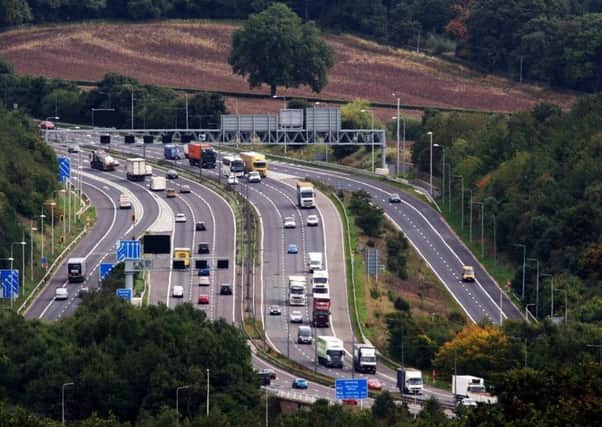Tim Morris: Getting freight moving – don’t let the M62 grind the Northern Powerhouse to a halt


It should not come as a surprise then that a new report has identified Yorkshire, and the M62 corridor in particular, as one of the UK’s hotbeds of freight congestion.
As one of the crucial crossroads for our Strategic Freight Network, we need to invest more and improve planning of freight movement through Yorkshire and on trans-Pennine routes.
Advertisement
Hide AdAdvertisement
Hide AdThe report has been commissioned by the UK Major Ports Group, the organisation that represents the ports handling three-quarters of all the UK’s port traffic. The purpose was to identify the key arteries that keep the flow of goods pumping around the UK, and the huge prize to the UK from making it run better.
After all, freight transport is the lifeblood of the UK economy. It makes industry happen, it brings materials to factories and takes finished products towards their markets. It puts the goods we all need on the shelves of our shops and brings parcels to our doors. It keeps us warm and our lights on.
The case for Yorkshire as a key part of our strategic freight network is overwhelming. A vital cluster of major ports are on the Humber, the UK’s busiest global gateway by tonnage, and this cluster is complemented by other top 10 UK ports in the north of England such as Teesport and Liverpool.
But it’s when we start to look inland that we really see what a key role Yorkshire plays in the Strategic Freight Network. Routes from London north to the crucial manufacturing, distribution and population centres of Yorkshire, and then onwards to the Tees and the Tyne are clearly highly important for the UK.
Advertisement
Hide AdAdvertisement
Hide AdAnd even more so, the east-west trans-Pennine route – Mersey – Manchester – Yorkshire – Humber – is of crucial importance for unlocking the true value from the Strategic Freight Network for the UK, the North and Yorkshire. Simply put, it is essential to improve freight movement along the ‘M62 corridor’. Essential not just for Yorkshire, but for the whole UK.
Road investment and smart motorways have their role to play. But the biggest opportunity for improvement is surely getting freight off the roads. The M62 has the highest share of road relative to rail freight – a whopping 98 per cent road share – of any of the freight routes identified in the report.
Transporting this freight by rail would mean better capability to move more freight across the North, and it would do so whilst reducing the congestion you face on your everyday journeys on the motorway. Yet, shockingly, we’re letting a generational opportunity to do just this pass us by.
The decision to exclude any additional rail freight capacity and capability from Network Rail’s £2.9bn trans-Pennine rail upgrade will result in the North’s utter dependence upon the M62 until 2030.
Advertisement
Hide AdAdvertisement
Hide AdOffering no additional rail freight capacity undermines the economic goal and objectives of the Northern Powerhouse, constrains Yorkshire business and worsens the productivity gap between the North and South of England. It also takes away one of the most important near-term options for improving the environmental impact of freight.
We hope it’s not too late to reverse this disastrous decision and the major ports stand shoulder to shoulders with other Northern voices in calling for urgent improvements to rail freight capability.
The major ports of the North and Yorkshire are vital drivers of prosperity. They have been so for centuries. But ports cannot deliver prosperity in a vacuum. They need good planning and operation of the freight networks that connect them to the rest of the economy.
The great major ports of the North are ambitious to continue their strong record of investment and growth. Our ports are important drivers of the regional economy, not just through providing great local access to the world for Yorkshire businesses, but they are also providers of high quality, highly productive (47 per cent more than the UK average) jobs.
Advertisement
Hide AdAdvertisement
Hide AdAnd each of these jobs supports six in the wider economy. Port connectivity also benefits local communities. For each £1 spent improving the connections of a port, £4 of value benefits the local community through better links for other businesses and tourism.
But to capture these benefits – and for you to travel around Gods’ Own County more easily and quickly – we need improvements to our freight arteries. Nowhere is this more vital than the M62. Freight matters. And Yorkshire, in particular, matters for freight.
Tim Morris is chief executive of The UK Major Ports Group (UKMPG).